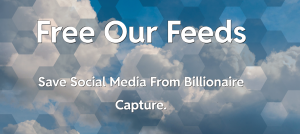Concerns about privacy, data ownership, censorship, and a lack of common decency across today’s social media platforms continue to grow, about as fast as the number of platforms and their popularity.
In response to the growing concerns over toxicity, misinformation, invasions of privacy, and negative impacts on mental health from many social media platforms, actions in support of a new kind of social media environment are growing, too. New social media platforms, conceived and developed to boost respectful and thoughtful online conversations, are being launched by public and private groups.
Civilized is the word used by many new social media platform operators. Algorithm-free and ad-free are other descriptions. So, too, decentralized. Maybe even Canadianized, based on who is involved in the new concepts (more on that below).
In any case, today’s existing social media feeds and platforms must be described as private, for-profit entities: what could be tools for the public benefit are firmly in the grasp of individual billionaire owners and their profit-seeking shareholders.
The people who own social media platforms often have different priorities than the people using them; those conflicting priorities join a long list of issues and impacts connected to social media usage overall.
That’s why an independent group of technology advocates – including a former Facebook investor and a leading web browser developer – is opening the door to a new social media environment, one where open governance of the social media system ensures it operates in the public interest, not a private one.
And it’s led at least one independent business owner to launch a new kind of online space, one he says is safer, healthier, and more inclusive.
He calls it Headbook (think of it as a ‘use your head’ not an ‘in your face’ book).
“Social media should be a force for good,” said Jim Bryant, who developed and launched the web platform while still running FacetCorp, a U.S.-based telecom and VoIP provider. “Headbook is a space where users can truly connect in a positive and constructive way. This is not just about changing the platform—it’s about changing the culture of online communication.”
 There’s no advertising on Headbook and no ad targeting, so Bryant says no user information is collected without their knowledge. There’s no algorithm that can be manipulated to promote disinformation. No ‘Suggested for You’ content that fills your timeline, whether you like it or not.
There’s no advertising on Headbook and no ad targeting, so Bryant says no user information is collected without their knowledge. There’s no algorithm that can be manipulated to promote disinformation. No ‘Suggested for You’ content that fills your timeline, whether you like it or not.
Headbook does have a Friends section and a Discussion section: in one, you communicate only with your friends and followers. But all users on the system can view and participate in Discussions, which are often user-suggested and set as specific topics. It’s a way to separate personal and family interactions from possibly more contentious discussions. Bryant says the site is for people who want to get along in a civil manner, and he encourages evidence-based dialogues that support problem-solving and meaningful exchanges. Of course, the platform rules (it’s free for the first month, $7 per month after that) prohibit what’s called bad social media behaviour. Users can flag content they think breaks the Headbook rules; administrators will review such complaints and expulsion could result.
Bryant’s initiative is admittedly “an experiment”, perhaps as much for him to learn from as for the user community.
That’s true for many of what are called decentralized social media networks.
They typically run on independently owned and operated servers, rather than a centralized server owned by some corporation; they are based on open-source software and the user community has real impact and input.
Seen as the opposite of a centralized social network like YouTube or the X-Twitter platform, decentralized social media platforms can provide better privacy and security for users by making use of blockchain technology and encryption. Blockchain technology lets data entries be stored on servers anywhere in the world; the data can be viewed in near real time by anyone on the network. Decentralized platforms give users direct control over their data and online experience, but they can also make use of hosted tokens and reward systems that incentivize users to create and engage with high-quality content.
(Bluesky and Mastodon are examples of a decentralized social network, as is Steem, which runs on a social blockchain.)
The initiative mentioned above, the one led by that group of technology advocates, wants to develop decentralized social media applications as part of a new social media environment that’s governed by open principles, not private interests.
 It’s called the Free Our Feeds campaign; it and its fundraising component are supported by a long list of notable global tech leaders, including Canadians Mark Surman, president of the Mozilla Foundation, and Philippe Beaudoin, now CEO at Numeno.ai.
It’s called the Free Our Feeds campaign; it and its fundraising component are supported by a long list of notable global tech leaders, including Canadians Mark Surman, president of the Mozilla Foundation, and Philippe Beaudoin, now CEO at Numeno.ai.
(More than two years ago, Beaudoin launched a Canadian social media app called Waverly on the open and decentralized AT Protocol, which is what the Free Our Feeds project is now incorporating. Some 20 years ago, the Mozilla community developed the popular Firefox browser, and it still advocates for an open and accessible Internet.).
Headbook is not part of the Free Our Feeds initiative, but it shares aspirations like those at Bluesky, Mastodon, PeerTube, and other self-hosted and decentralized social networking sites: a desire to be a creative, constructive online community that operates without algorithmic targeting, data exploitation, or commercial manipulation.
The need is clear and it’s been so for a while. At the time of its launch, Waverly itself was described as a new social media platform that would inspire a healthier approach to social media, foster meaningful connections, and support users’ well-being by giving them more control over their experience, reducing their concerns about privacy and data usage.
And while the application has since become more of a B2B tool through Beaudoin’s new company Numeno.ai, it clearly speaks to a more civilized – or, sorry, is that more Canadianized!?! – way of connecting with people.
# # #

Social media is often blamed for exacerbating incivility, say researchers at Duke University. Image from the Duke report, How to Depolarize Political Toxicity on Social Media.
-30-



